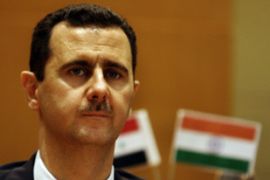IAEA to visit Syrian ‘nuclear site’
No evidence of Syrian nuclear proliferation, IAEA chief says.

“The reality here is that there’s some pretty strong evidence out there about what Syria was doing,” said Tom Casey, the US state department deputy spokesman.
Bashar al-Assad, the Syrian president, said that the US evidence was “fabricated 100 percent”.
Secrecy over attack
Israeli officials did not announce the attack for days, and the secrecy of the operation has added to the lingering mystery over Al-Kibar.
Syria maintains that Al-Kibar was a disused military building but has refused to define the exact use of the facility.
Damascus cleared site after the attack.
Syria has welcomed the inspection but insists that it will be limited to Al-Kibar site.
US news reports and diplomats close to the IAEA have said that the nuclear watchdog was also interested in two or three other facilities.
“Syria invited the IAEA and will co-operate with it. Al-Kibar is a military facility … it is not nuclear,” al-Assad said.
‘No nuclear evidence’
Mohamed ElBaradei, the IAEA chief, urged Damascus to co-operate with the inspectors but stressed that there was no evidence of Syrian nuclear “foul-play”.
“We have no evidence that Syria has the human resources that would allow it to carry out a large nuclear programme. We do not see Syria having nuclear fuel,” he said.
Der Spiegel, the German news weekly, reported on Sunday that Syria, North Korea and Iran jointly planned to develop a nuclear reactor for military use at Al-Kibar.
It was to be used as a temporary site for Iran to develop a nuclear bomb until it could do so on its own territory, Der Spiegel said, quoting German secret service reports.
There was no independent confirmation of the report.
Syria, a party to the nuclear Non-Proliferation Treaty which Israel refuses to sign, has “limited nuclear resources and capabilities” focusing primarily on civilian research, according to the Nuclear Threat Initiative, US charity .
Analysts attribute concern about Syria’s nuclear intentions to its close ties with Iran and North Korea – both of which are under scrutiny by the IAEA over their nuclear programmes.